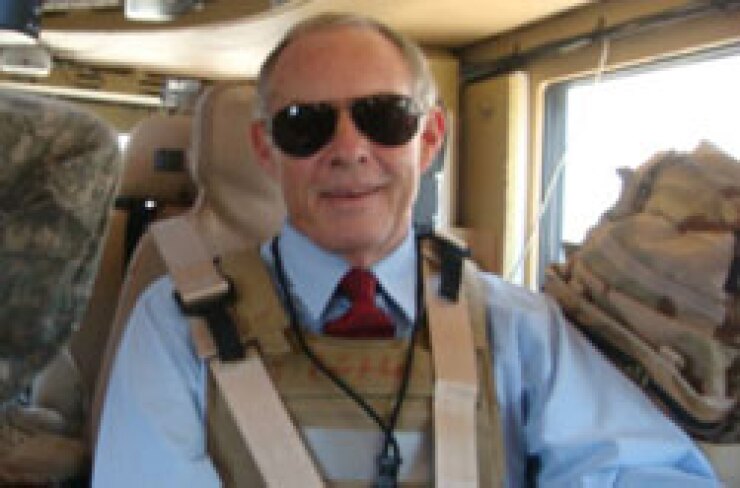
Retired Air Force Major General William Lynch helped rebuild Iraq. But can he repair Harrisburg?
Gov. Tom Corbett on Friday nominated Lynch, who worked extensively in Baghdad, to succeed David Unkovic as the receiver for a different kind of torn-up city. Pennsylvania’s distressed capital is immersed in $310 million of incinerator-related bond debt and endless political infighting.
The Commonwealth Court of Pennsylvania must confirm the nomination of Lynch, 69, which Corbett made through the Department of Community and Economic Development. It will hold a hearing at 10:30 a.m. May 24.
“I’m a bit of a sucker for a challenge,” Lynch said at a news conference Friday as he prepares to oversee a city that missed two general obligation bond payments in March totaling $5.3 million.
Lynch’s budgetary experience at the state and local levels appears limited, but from 2006 to 2007 he was chief of staff to the U.S. State Department’s office of Iraqi reconstruction management in Baghdad. The offices were responsible for transitioning Iraq to self-sufficiency and to maintain an effective diplomatic presence in the violence-wracked country. He returned to Baghdad in 2008-2009 as director of the U.S. embassy’s office of joint strategic plans and assessment.
“I’m used to situations with a large budget and diverse groups of people,” Lynch said.
Harrisburg, with a population of 49,500, has diverse groups — and clashing factions. Mayor Linda Thompson and the City Council have battled over financial recovery, the council three times voting by 4-3 margins against a state-supported workout plan, known commonly as Act 47. That prompted the state to pass takeover legislation last fall.
Thompson has called her council opponents “unfit to hold office,” while council member Brad Koplinski last week called on Thompson to resign.
Additionally, Thompson and city Controller Dan Miller don’t talk to each other. Miller intends to run for mayor in 2013.
Corbett three weeks ago acknowledged the difficulties a Harrisburg receiver faces. “I think you can tell it would take a certain type of individual to willingly and voluntarily place themselves in that position, and you read between the lines on that one,” he said.
Unkovic, named receiver in November, abruptly quit on March 30, citing “political and ethical crosswinds” in his handwritten resignation letter. The City Council’s attorney, Mark Schwartz, has requested the Commonwealth Court to subpoena Unkovic and ask what he meant. The court has yet to respond.
"He submitted a handwritten letter that should have been enough for the court on its own to initiate proceedings, any time after March 30. Now here we are with a short time to confirm this replacement. New guy, same 'untenable' environment of 'political and ethical crosswinds.' The court could have done this on its own," Schwartz said.
"Forgive me if this boggles my mind."
Unvokic had drawn grudging praise from critics of the receivership by saying major creditors should make concessions on the incinerator debt.
After those creditors — including TD Bank, Bank of New York Mellon Trust Co., and incinerator bond insurer Assured Guaranty Municipal Corp. — got a Dauphin County court to provide a separate receiver to oversee the incinerator debt, Unkovic asked U.S. attorney Peter Smith and Pennsylvania Attorney General Linda Kelly to investigate “possible illegal activities” surrounding the bond deals. Unkovic resigned two days later.
Unkovic also scored public-relations points through his town-meeting style appearances, although Sen. Jeffrey Piccola, R-Susquehanna Valley, criticized him for doing so. Piccola had shepherded the takeover legislation last fall.
Lynch, who called himself “pretty apolitical,” Friday said he would talk with Unkovic if the latter is available. He spoke briefly with Thompson by phone and expects to meet with her in person soon.
“We have groups dedicated to the effort,” said Lynch, who cited the DCED and law firm McKenna Long & Aldridge LLP, which was working on a recovery plan that Unkovic released Feb 6.
“There’s a great amount of intellectual capital and a great amount of dedication to this problem. So I have all of that backing and I’ll definitely need it,” Lynch said.
Unkovic shortly thereafter issued requests for qualifications related to the sale or lease of the incinerator as well as revenue-producing parking garages and the sewer and wastewater systems.
He had hoped to sell or lease city assets by June 30, the day a state prohibition against a bankruptcy filing expires, but his resignation may have slowed the process.





